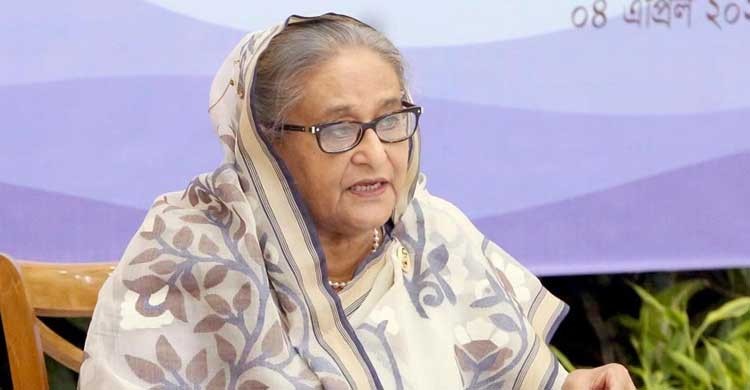PM for nature based development philosophy
04 April 2022, 03:19 pm | Updated: 24 February 2025, 04:18 am

Prime Minister Sheikh Hasina on Monday said her government prioritised nature-based plans to ensure country's overall development, urging all concerned to conserve rain and flood water alongside protecting water bodies, reducing groundwater usage and maintaining the rivers' normal flow.
“We're giving emphasis on nature based solutions in the development philosophy. We've to find out the nature based strategy for proper management of the water resources,” she said.
The premier came up with the assertion while addressing a function at Pani Bhaban in city’s Green Road area as the chief guest organised by the Water Resources Ministry, marking the World Water Day-2022.
The prime minister joined the function virtually from her official Ganobhaban residence in the capital.
She asked all concerned to keep two things in mind--harvesting rainwater and building water conservators--while taking any development plan.
The PM added: “We have to focus on harvesting rainwater and its conservation in ground.”
The prime minister also asked all concerned to open connecting points of rivers with canals, haors and baors, saying otherwise the navigability of the rivers would be damaged.
She said all these things will have to be taken into consideration while adopting development plans.
State Minister for Water Resources Zaheed Farooque and Deputy Minister AKM Enamul Hoque Shameem spoke on the occasion while its Senior Secretary Kabir Bin Anwar gave the welcome address.
An audio-visual song on the World Water Day was played while a documentary on Bangladesh's water resources management was also screened at the function.
This year's World Water Day theme is “Groundwater-making the invisible visible”.
The World Water Day is held annually on March 22 as a means of focusing attention on the importance of freshwater and advocating for the sustainable management of freshwater resources.
The United Nations General Assembly adopted the resolution by which March 22 of each year was declared World Day for Water, to be observed starting in 1993, in conformity with the recommendations of the United Nations Conference on Environment and Development (UNCED) contained in Chapter 18 (Fresh Water Resources) of Agenda 21.
Sheikh Hasina advocated for creating buffer zones to preserve additional water or flood water alongside maintaining navigability by dredging the rivers, as those water can be used for cultivation in winter.
“We have to know how to live and build relations with flood (as Bangladesh is a natural disaster prone country,” she added.
The prime minister also instructed to plant trees while taking projects of constructing roads or embankments as those would help protect landslides.
She directed all to decrease the dependency on ground water as excessive use of groundwater can increase the risk of frequent earthquakes because Bangladesh is considered as earthquake prone country.
The premier said her government has been implementing various programmes including supplying safe drinking water to the people after purifying water of rivers and using surface water in irrigation to reduce the use of groundwater.
She, however, requested the countrymen to show austerity in using water in any work such as household, construction or irrigation as the government has to expend huge money in purifying the water.
Despite Bangladesh has no contribution to creating adverse impact of climate change, she said, some tiny Islands and countries like Bangladesh have to bear the brunt of the impact, adding, “So, we have to take measures of our own to save our country.”
To face the natural calamities and adverse impact of climate change, Sheikh Hasina said her government has been formulating "Mujib Climate Prosperity Plan" as special directives have been given in this regard.
The prime minister said they have formulated Delta Plan-2100 and started implementing it aimed at giving generation after generation a secured and improved life.
Sheikh Hasina said her government has been attaching priority on implementing the United Nations announced SDG-6 by ensuring safe sanitation and pure drinking water to all by 2030.
“We have successfully ensured sanitation for 97 percent people. And we're taking various measures to ensure safe drinking water for all, she said.
The prime minister mentioned that 3.6 billion and 2 billion people across the globe are deprived of safe sanitation and pure drinking water respectively.
Noting that Bangladesh has a huge water resources, she said, "If we can ensure proper use of our huge water resources, the countrymen will never face safe drinking water crisis. Rather, we can supply safe water to the world."
The prime minister said that Father of the Nation Bangabandhu Sheikh Mujibur Rahman established "Bangladesh Water Development Board” and “Indo-Bangladesh Joint Rivers Commission (JRC)” in 1972 aimed at ensuring better water resources management.
Sheikh Hasina went on saying, as a follow up, the Awami League government with its utmost sincerity formulated the National Water Policy, 1999, Bangladesh Water Act, 2013 and National Policy for Safe Water Supply and Sanitation-1998.






















